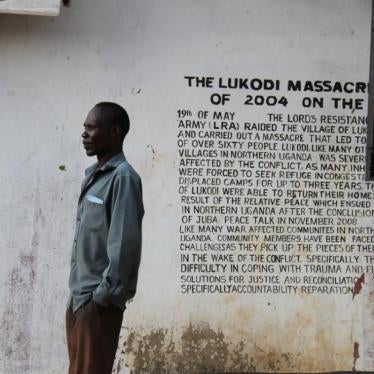(New York) - U.S. attacks on the new war crimes court were rejected again today at the United Nations, but the principle of universal justice is still under serious threat from Washington.
The U.N. Security Council rejected a U.S. proposal that would have exempted peacekeepers from the authority of the International Criminal Court. Council members agreed to extend the authorization for Bosnia peacekeeping by July 15.
"This court was founded on the principle of universal justice, and that principle is under attack from ideologues in the Bush administration," said Richard Dicker, director of the international justice program at Human Rights Watch. "The Security Council was right to rebuff those attacks. We hope that they hold firm in the days to come."
The US proposal would have exempted from the court's jurisdiction, for an initial period of one year, officials involved in peacekeeping from governments that have not ratified the court's treaty. Even more important, the exemption would remain in effect indefinitely until the Security Council votes to lift it, meaning that any single permanent member of the Security Council could use its veto to block prosecution forever.
The exemption would be valid even if the peacekeepers were responsible for crimes committed in a country that has ratified the treaty.
Under Article 16 of the treaty establishing the International Criminal Court, the Security Council may request the court to suspend any "investigation or prosecution" for a one-year renewable period. But that provision requires the positive vote of the Security Council each year, meaning that any of the five permanent members could veto a continued deferral, and allow the court to prosecute.
The U.S. proposal, by contrast, would keep the suspension in place permanently until a positive vote of the Security Council decided otherwise. That would allow Washington to permanently block ICC investigation of anyone involved in operations sponsored or authorized by the U.N.
The U.S. proposal would also weaken Article 27 of the treaty, which establishes the "irrelevance of official capacity." This provision allows someone like Slobodan Milosevic, former President of Yugoslavia, to be prosecuted even though he might claim head-of-state immunity under national or international law. The U.S. proposal would send the disturbing signal that certain persons, based on their official capacity as peacekeepers, could be above the law.
The U.S. proposal would also alter the jurisdiction of the court: under the ICC treaty, if genocide, war crimes, or crimes against humanity are committed on the territory of a State Party, the court would have jurisdiction over the accused regardless of his or her nationality, and every State Party would have an obligation to surrender an accused to the ICC. In creating an exemption for peacekeepers, the U.S. proposal would alter those fundamental obligations.
"The treaty's drafters resisted years of U.S. pressure to insist that no single government could manipulate the court's docket," said Dicker. "If countries capitulate to U.S. pressure now and hand decisions on peacekeeper prosecutions to each single permanent member of the Security Council, the council breaches that important principle."
Dicker said the use of the Security Council to rewrite a multilateral treaty set a dangerous precedent far beyond the harm it may do to the ICC. The ICC treaty says that seven-eighths of all the State Parties have to vote for any amendment to the treaty. The United States is now trying to change the treaty using its muscle at the U.N. Security Council.
In May, the Bush administration repudiated the U.S. signature on the ICC treaty. In addition to its campaign at the Security Council to exempt peacekeepers from the court's jurisdiction, Washington has been working to undermine the Court's jurisdiction over U.S. troops stationed abroad on the territory of governments that have ratified the court's treaty.
Human Rights Watch has hailed the new court as the most important new human rights institution in fifty years. The treaty establishing the court took effect on July 1, 2002. The ICC Statute has been signed by 139 countries and ratified by 76 countries.
At stake, Human Rights Watch said, is both the court's independence and its ability to apply the rule of law without distinction on the territory of ratifying governments.
"It is sad that the historic achievement of creating the Court is being threatened by the actions of one government," said Dicker. "Rather than focusing on the goals of the court - to prosecute future Pol Pots or Saddam Husseins - the U.S. government has fixated on guaranteeing itself an ironclad exemption from the Court's jurisdiction. The U.S. attempted to achieve that result when the ICC treaty was drafted in 1998, and failed. It must not be permitted to do so now."
|
News Release
U.S. Attack on War Crimes Court Rejected at U.N.
Your tax deductible gift can help stop human rights violations and save lives around the world.
Region / Country
Most Viewed
-
November 25, 2019
A Dirty Investment

-
June 3, 2025
“They’re Ruining People’s Lives”

-
December 21, 2023
Meta’s Broken Promises

-
January 25, 2024
“We’re Dying Here”

-
November 12, 2018
“Shall I Feed My Daughter, or Educate Her?”


